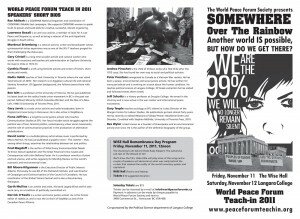ANOTHER WORLD IS POSSIBLE- BUT HOW DO WE GET THERE?
Visionary Struggles in the Twentieth Century and Why They Matter Today
We are confronted with the worst crisis humanity has ever faced. From the growing number of wars without end to the neo-liberal assault on workers’ living standards to the environmental threat to human life as we know it, capitalism has led the world to the brink. We need to drag it back. BUT HOW?
The twentieth century was packed with assaults on the established order and a desire to rearrange human existence in a way that made sense, if not profits. Under the banner of socialism, communism, social democracy, anarchism or a variety of other names, millions of human beings sought to create a “better” world. There were more failures than successes, but even the failures have much to teach us about how to do it better today. Some of the visions that inspired them will be the focus of the fourth World Peace Forum Teach In November 11- 13- the Remembrance Day weekend- in Vancouver. Here we will look at examples of attempts- some successful, others not, to “bring to birth a new world from the ashes of the old” as Ralph Chaplin wrote in “Solidarity Forever” in 1915. The conference will not be a history lesson but rather the application of experience to the creation of a strategy for TODAY!
We have identified four themes that will structure our program- Economy; Ecology, War& Peace and Culture. Within these four broad topics we plan to look at specific events, movements and, yes, visions that have moved people and inspired them to action. Under economy we will make a comparison of the Sit In Strikes in the Ford car plant in Flint, Michigan with Barcelona under workers’ rule – both of which took place in 1936 and 1937 and both of which had a lasting impact, all the more relevant in the recent experience of public sector workers in Wisconsin. Under ecology we will look at the origins of the so called ‘environmental’ movements of the 1970’s, especially Greenpeace which began in Vancouver, moving through Earth Day to the current crisis of climate change. The resistance of aboriginal peoples from Bolivia to BC will be part of this. War and Peace will feature a session on Tipping Points 1973-1975 which will look at the defeat of the Chilean Revolution in 1973, victory of the Vietnamese in 1975, and the defeat of the Portuguese Revolution later that same year. It will also feature a similar session looking at South Africa, Chiapas and Iraq. These experiences resonate today in the revolutions and counter-revolutions in the Maghreb and Middle East. Within the framework of Culture we will have sessions that explore the twenties cultural avant-garde movements of surrealism, constructivism, and others and their corruption into socialist realism in the thirties. We’ll also look at the evolution of current musical activism in a session called ‘From Bella Ciao to Manu Chao’.
We plan to look at movements from different places and times, calling upon our collective historical memory and the testimony of participants in current campaigns from Cairo to Wisconsin.
If you’ve been to a previous World Peace Forum Event, or if you haven’t, as long as you have imagined bringing ‘to birth a new world from the ashes of the old’, we hope you will plan to join us as we transform Remembrance Day from a celebration of war into a vision of a peaceful, just and sustainable world.
World Peace Forum Teach In Program Committee
Speaker Bios and Schedule below or download PDF
Speakers` Bios
Rae Abileah is a CODEPINK National Organizer and coordinator of CODEPINK’s Middle East campaigns. She supports CODEPINK women to speak truth to power and build skills for creative, successful, vibrant organizing.
Lawrence Boxall is an anti-war activist, a member of Jews for A Just Peace and Stopwar.ca, as well as being a veteran of the anti-Apartheid struggle in South Africa.
Mordecai Briemberg is a veteran activist, writer and broadcaster whose quintessential sixties experience was as one of the SFU 7 teachers purged for their challenging the status quo.
Gary Cristall is a long time socialist activist and cultural worker who works with musicians and teaches arts administration at Capilano University. He lived in Chile in 1972-73.
Cynthia Flood is a left-wing feminist activist and writer of fiction- short stories and novels.
Nadia Habib teaches at York University in Toronto where she was voted ‘best lecturer of 2010.’ Her research is on Egyptian cultural life and national identity formation. Of Egyptian background, she follows events there with passion.
Ben Isitt is a professor at the University of Victoria. He has just published his latest book on the radical trade union movement in BC in the post war period- Militant Minority: British Columbia Workers and the Rise of a New Left, 1948-72 (University of Toronto Press, 2011.
Gary Jarvis is a trade union activist and radio broadcaster, born in England and now living in Vancouver. He is also active in StopWar.ca.
Fiona Jeffries is a longtime social justice activist who teaches Communication Studies at SFU. Her focus includes social struggles against the political use of fear, feminist politics, contemporary urban social movements, and the role of communication practices in the production of alternative globalizations.
David Lester is a multidisciplinary artist whose music is performed by Mecca Normal. He has just published a graphic novel – The Listener – that, among other things, examines the relationship between art and politics.
Fred Magdoff is the author of What Every Environmentalist Needs To Know About Capitalism and The Great Financial Crisis: Causes and Consequences with John Bellamy Foster. He is a professor emeritus of plant and soil science, an
Teach-In 2011 Videos
Gary Teeple
Ben Isitt
Cynthia Flood
Nadia Habib
Fred Magdoff
Rae Abileah
Derek O’Keefe
Bill Moore-Kilgannon Public Interest Alberta

